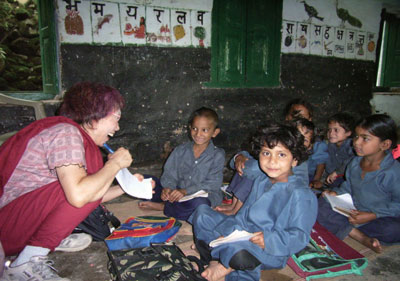
Health Education Project, India, by Terra People Act Kanagawa/TPAK supported by JICA Partnership Program
(photo: Terra People Act Kanagawa/TPAK)
CHAPTER 4Japanese People Active in the International Community and Roles of Diplomacy |
1. |
Japanese People Active in the International Community |
(a) |
Japanese People Working at International Organizations |
It has been becoming more important for the international community to respond to various challenges, regarding not only terrorism and conflicts, which threaten political and security frameworks, but also global issues such as violations of human rights, poverty, infectious diseases, and worsening environmental degradation resulting from rapid globalization. In this context, the roles played by international organizations are becoming all the more significant and accordingly the duties of international civil servants working at international organizations are increasing.
In order to augment the number of Japanese personnel in the United Nations and other international organizations, Japan has been making efforts to identify qualified candidates while urging international organizations to hire and to promote Japanese staff.
(b) |
Activities of Non-governmental Organizations |
More than 400 Japanese non-governmental organizations (NGOs) are estimated to be involved in international cooperation activities. In light of the various issues facing the international community, such as natural disasters and regional conflicts, NGOs that are capable of providing well-tailored, swift, and flexible responses well in tune with local residents are coming to have greater and greater importance. Japanese NGOs have been conducting activities in the fields of not only development assistance and emergency humanitarian relief but also human rights, international organized crime, the environment, trade, disarmament, and the United Nations, among many others. The Ministry of Foreign Affairs attaches an importance to the role of NGOs, and is working to strengthen cooperation with NGOs as an important partner in Japan's diplomacy. NGOs represent Japan's physical presence in foreign assistance by providing support in the international community.

Health Education Project, India, by Terra People Act Kanagawa/TPAK supported by JICA Partnership Program |
(c) |
Japan Overseas Cooperation Volunteers and Senior Volunteers |
In June 2007, the total number of Japan Overseas Cooperation Volunteers (JOCVs) dispatched to date topped 30,000. The JOCV program was launched in 1965 to take advantage of the great enthusiasm of Japanese youth for foreign countries, with 26 young volunteers dispatched to Cambodia, the Philippines, Lao PDR, and Malaysia. Since then, the JOCV has sent young Japanese to 82 developing countries over 40 years. The Japanese serving as JOCVs and Senior Volunteers (SVs) contribute to growth in developing countries while playing a significant role in fostering mutual understanding and friendship between Japan and developing countries.